Having a commercial pool can be an attractive addition to any business, organization, or country club. But with so many regulations and safety measures to consider, it’s important to know what you need to do in order to ensure the safety of your guests and maintain a healthy environment.
From designing and constructing cutting-edge codes to having essential safety equipment on hand and meticulous maintenance practices, we’ll cover all the must-know regulations for commercial pools.
You don’t want anything getting in the way of your visitors having a great time! Let’s dive into what you need for successful swimming pool management that keeps everyone safe.
Design & Codes
You must be aware of the various construction and design requirements for commercial pools in order to ensure that your pool is compliant with local regulations. This includes adhering to codes like the Americans with Disabilities Act (ADA), National Swimming Pool Institute (NSPI), and American National Standards Institute (ANSI).
To best achieve compliance, you should consider hiring a qualified pool contractor who has experience in designing and constructing pools according to these standards.
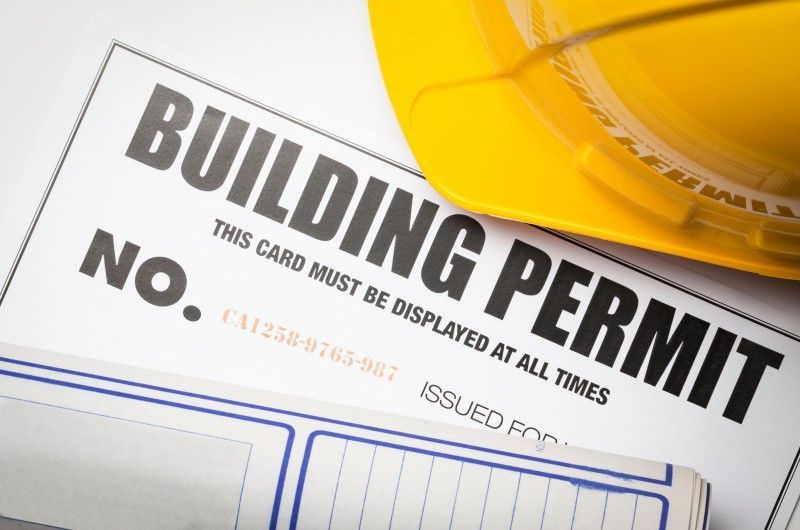
Lifeguards and Signage
You’ve likely seen lifeguards stationed at commercial pools and wondered what their duties consist of. Lifeguards are responsible for enforcing all rules, ensuring the safety of swimmers, responding to emergency situations, performing rescues if necessary, and helping to maintain a healthy environment in the pool area.
Signage is also required to be prominently displayed around the pool warning of the absence of a lifeguard and potential dangers like drowning risks.
Lifeguard Duties and Responsibilities
Lifeguards are essential in keeping commercial pools safe. They monitor swimmers, prevent accidents, and provide assistance when needed. They should be knowledgeable of pool rules, safety protocols, and drowning prevention.
To ensure their effectiveness, lifeguards must receive proper training and certifications to stay up-to-date with the latest standards. Here are four key aspects that lifeguards must follow:
- Understand safety protocols for water testing and chemical balance requirements.
- Have a thorough knowledge of emergency procedures for rescuing swimmers in distress.
- Regularly observe the pool area to identify potential hazards or unsafe behavior from swimmers.
- Provide instruction on swimming techniques and pool etiquette to patrons when necessary.
Overall, lifeguards have an important role in ensuring the safety of all those who use a commercial pool. They’re like your pool’s guardian angels!
Essential Safety Equipment: Your Pool’s Guardian Angels
You must ensure that your commercial pool is equipped with the necessary safety equipment to protect swimmers.
Ensure that all pool safety equipment meets local health department regulations, as well as manufacturer’s recommendations.
This includes items such as barriers, Secchi Disk, Rescue Pole, Shepherds Crook, Ring Buoy, Depth Markers, Rope & Float Line and signage warning of the absence of a lifeguard and potential risk of drowning.
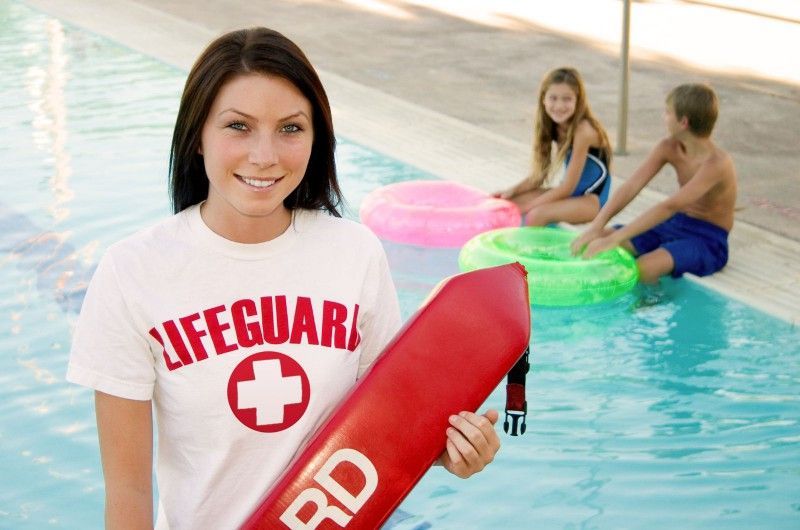
Pool Safety Equipment Checklist
Ensuring your commercial pool is well-equipped with necessary safety equipment can help keep swimmers safe. In fact, drowning is one of the leading causes of death for children under 5 in the U.S., so it’s important to take precautions.
Essential safety equipment includes:
1. Water testing kits – these ensure that water pH levels, alkalinity, calcium hardness and chlorine levels are monitored and maintained at a safe level.
2. Shock treatment – this helps destroy contaminants in the water and prevents algae growth.
3. Drain covers – these are designed to prevent entrapment due to suction from drains or skimmers and must comply with Virginia Graeme Baker Pool and Spa Safety Act (VGB) guidelines.
4. Safety signs – these should be prominently displayed near entrances and throughout the pool area warning patrons about hazards such as no diving or no running allowed in certain areas of the pool.
5. Rope & float line – this helps separate shallow from deep ends of pools for swimmers’ safety, making boundaries between swimming lanes more visible for better navigation by swimmers.
Having all these pieces of essential safety equipment in place will not only help protect swimmers but also create a positive impression on potential customers considering membership options at your commercial facility or organization. With proper maintenance mastery; keeping your pool in pristine condition, you can make sure that everyone enjoys their experience safely!
Maintenance Mastery: Keeping Your Pool in Pristine Condition
You need to be diligent about pool maintenance in order to ensure a safe, healthy environment for swimmers. Regularly testing and recording parameters like water pH levels, alkalinity, calcium hardness, and chlorine is essential.
Additionally, it’s important to:
– Keep the pool area clean and free of debris.
– Maintain the deck regularly.
– Provide a designated area for pre-swim showers.
– Keep emergency services nearby.
– Post ‘No diving’ signs near shallow areas.
Pool Maintenance Best Practices
To ensure your commercial pool is safe for swimmers, it’s important to follow proper maintenance procedures.
Regular testing and recording of water parameters like pH levels, alkalinity, calcium hardness, and chlorine levels should be done according to manufacturer’s recommendations and local health department regulations. Additionally, chemical treatments may need to be applied periodically depending on the readings from these tests.
Cleanliness is also essential; the deck should be regularly cleaned and debris removed from the water surface. Skimming the water surface will help keep it clear of any floating objects that could cause a hazard or attract contaminants.
Proper pool vacuuming and drainage systems must also be in place to remove any sediment buildup. This can help maintain good water quality and prevent stagnation that could lead to contamination by bacteria or other organisms.
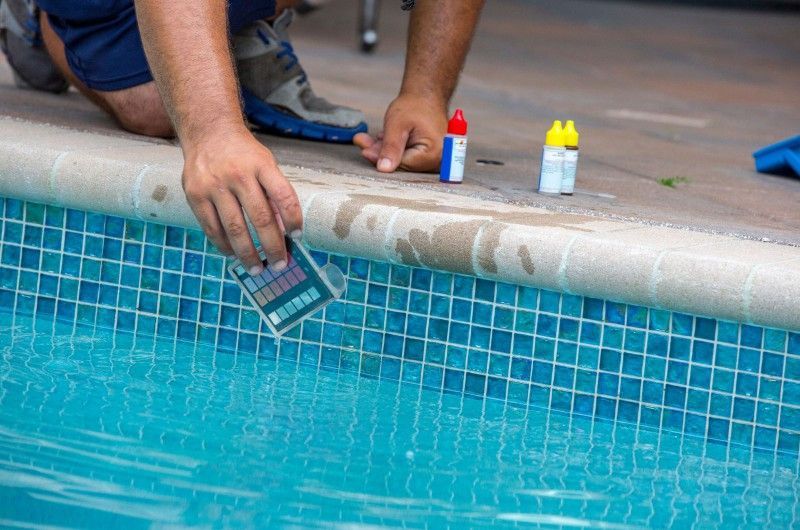
Additional Maintenance Considerations
In order to maintain a healthy and safe commercial pool, it’s important to consider additional maintenance considerations beyond basic maintenance.
Water testing should be done regularly to ensure that the chemical balance is maintained. Sanitizing protocols should be followed according to local health department regulations. Cleaning supplies and pool covers must be readily available in case of an emergency. Additionally, chemical balancing should be monitored closely and any changes documented in a log book.
Having all of these measures in place will help ensure that your commercial pool is a safe environment for swimmers. Taking preventive action against unexpected events is also essential, as it can save lives in an emergency situation.
An accessible phone nearby for emergency services is necessary, along with ‘No Diving’ signs near shallow areas and other safety equipment like Secchi Disk, Rescue Pole, Shepherds Crook, Ring Buoy, Depth Markers & Rope & Float Line at arm’s reach away from the pool edge or within the vicinity of the swimming area. These extra steps can go a long way towards keeping swimmers safe while they enjoy their time at the commercial pool.
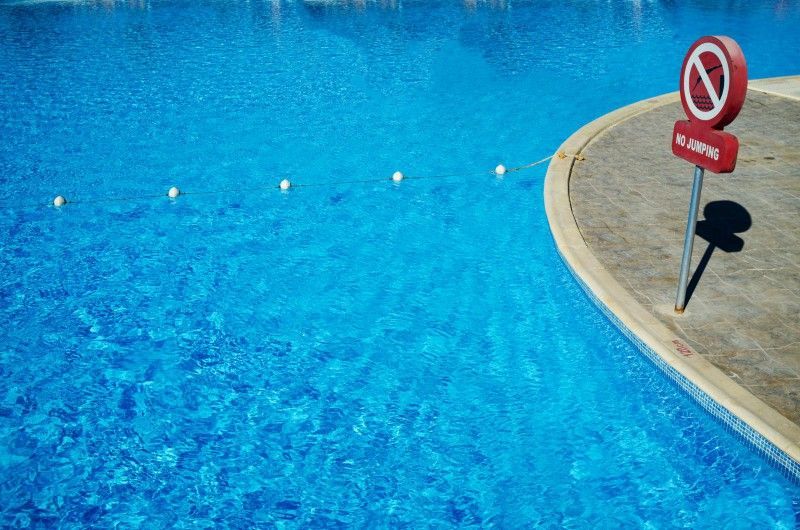
Emergency Preparedness: Staying Ahead of the Unexpected
It’s essential for commercial pools to have an Emergency Response Plan in place. This plan should include protocols and procedures for responding to various pool-related emergencies, such as drowning or medical incidents.
Having quick access to emergency services is key for responding timely and efficiently in the event of an unexpected situation.
Emergency Response Plan
Having an emergency response plan in place for commercial pools is essential; shockingly, 70% of pools don’t have one.
A comprehensive emergency response plan should include key components such as emergency staffing, evacuation plans, pool inspections and maintenance records, CPR training for staff members, and water safety protocols.
This helps to ensure that all safety measures are in place and that staff members are well-trained on how to respond quickly and effectively in case of any emergencies or incidents. Emergency staff should be aware of their roles and responsibilities during evacuations or other emergency situations.
Evacuation plans should be communicated clearly with patrons via signage near the pool area so they know what action to take if necessary. Pool inspections should also be conducted regularly to identify potential hazards or risks associated with the pool environment.
Furthermore, CPR training should be provided to all staff members so they can act swiftly when needed. Finally, water safety protocols must be strictly followed by everyone using the facility at all times in order to minimize accidents or injuries.
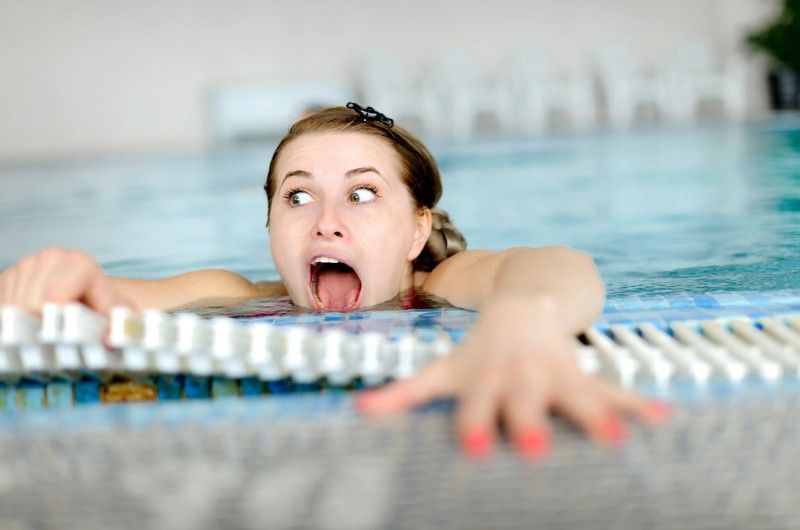
Avoid Long Hours Poring Over the Rules
You’re now equipped with the information and knowledge needed to ensure your commercial pool is up to code and safe for everyone. The pool and spa at your business or organization can be both beautiful and functional. You tell us what you want and how you want it, and we’ll take care of the rest.
With thoughtfully designed features, lifeguards or signage on watch, essential safety equipment at the ready, and a maintenance plan in place, you can rest assured that your guests will have a great time. Let us worry about the regulations so that you can focus on providing a great experience for your customers or members.

